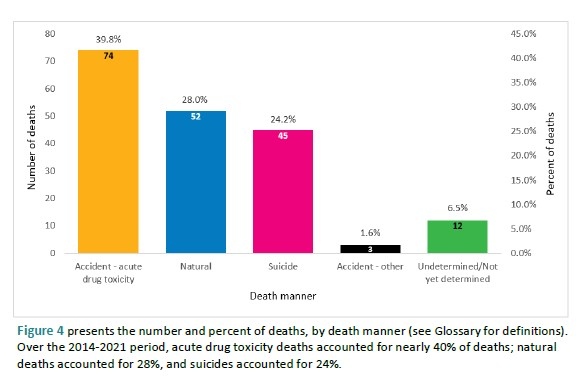Inmates in Ontario jails are dying at a 'dramatically' increasing rate, coroner's report shows
 An inmate can be seen inside a segregation cell at the Collins Bay Institution in Kingston, Ont., on Tuesday, May 10, 2016. THE CANADIAN/Lars Hagberg
An inmate can be seen inside a segregation cell at the Collins Bay Institution in Kingston, Ont., on Tuesday, May 10, 2016. THE CANADIAN/Lars Hagberg
A new report released by the office of Ontario's Chief Coroner suggests deaths among incarcerated populations have “risen dramatically” in recent years, painting a picture of a criminal justice system that is struggling to deliver on basic human rights.
The report, authored by the Ontario Chief Coroner’s expert panel on deaths in custody, examines non-homicide deaths of inmates from 2014 to 2021.
In all, there were 186 deaths during this period – with 19 deaths in 2014, 25 in 2019, and 46 in 2021. The main causes of death are identified as accidental overdoses, suicide, and "natural." When homicide deaths are factored in, the last eight years saw 192 inmates die while in provincial facilities.
“Any death that occurs in the custody of a provincial correctional facility is one too many,” the members of the panel said in their opening statement. “Persons who enter custody have [...] every reason to expect that those who assume control over so many aspects of their lives will at minimum protect them from harm and unwellness."
However, the report suggests the system is struggling to deliver on basic promises such as providing appropriate and up-to-date healthcare, ensuring correctional officers have comprehensive training in emergency care, mental health, trauma and violence-informed practices, and providing supportive programming to inmates.
“With very rare exception, almost every life lost in our sample could be deemed a preventable death,” it reads.
 Source: An Obligation to Prevent - Report from the Ontario Chief Coroner’s Expert Panel on Deaths in Custody
Source: An Obligation to Prevent - Report from the Ontario Chief Coroner’s Expert Panel on Deaths in Custody
The panel says, ultimately, the report revealed "much about "a criminal justice system that is struggling to deliver on basic promises [...], and an in-custody reality that in its current state is increasingly both ineffective and unsafe."
“The picture varies from opaque to astoundingly clear. The solutions range from simple to frustratingly complex. The need for action is simply compelling and urgent," the report reads.
Dr. Jerry Flores, an associate professor of sociology at the University of Toronto who has studied incarcerated populations for more than a decade, told CTV News Toronto Tuesday that while the numbers may not appear large at first, the increasing trend is reason for alarm.
“I think what's even more concerning is why they’re increasing,” Flores said. “Almost 40 per cent of these deaths have been attributed to acute drug toxicity and I think that that sort of points to a couple of larger issues.”
But, Flores says, for better or for worse, illicit drugs have made their way into Ontario prisons.
“I think the next step is really to understand how we can stop some of these deaths and the way we stop some of these deaths are by having quality access to healthcare,” he said.
In their report, the panel made 18 recommendations on how to improve inmate well-being and reduce the number of deaths inside correctional facilities, including the establishment of new quality standards for correctional health-care services in alignment with best practices from relevant professional colleges and organizations.
“To prevent a segment of the population from accessing healthcare, it starts to infringe on human rights,” Flores said. “How do we make sure that all incarcerated people have access to high-quality medical care which is guaranteed by the Charter of Rights and Freedoms?”
The panel’s recommendations stretch further than improving correctional health-care services – they also include, but are not limited to, moving away from maximum-security facilities when unnecessary, reducing the number of individuals in custody in pre-trial stages, and improving record keeping and public transparency.
“A lot of the facilities where these people are being housed are designed as maximum security facilities – really highly structured, highly surveilled places,” Flores said. ”However, most of Canada’s incarcerated population is there for nonviolent drug-related offenses, so many of these facilities aren't currently set up for that.”
When reached for comment, the Ministry of the Solicitor General, who oversees the operations of Ontario’s correctional facilities, said they extend their thanks to the chief coroner and panel for the insights provided in the report, and “will be taking time to review all of the recommendations and respond to the Chief Coroner within the requested six months”
“We must do everything possible to prevent deaths in custody, and we are focused on building a better, safer, and healthier corrections system in Ontario,” Andrew Morrison, spokesperson for the ministry, said in an emailed statement to CTV News Toronto.
“We know that the people who have died in custody were spouses, parents, children, grandchildren, siblings, friends, and that they mattered to all those they loved, and were loved by," he said.
Morrison said that a great deal of work is already underway to address the issues identified by the report, but that the government will continue to improve training for frontline staff and make strategic investments in infrastructure, staffing, and healthcare.
In the meantime, Flores said all levels of government need to increase funding and access to carceral facilities, along with funding research on incarcerated populations.
“There are plenty of able-bodied people in various sociology and criminology departments across Canada that can help find evidence-based solutions for these issues,” he said.
“So I think that we need to continue to do as much as we can to make these spaces more accessible, more open, and continue to lead research on some of the root causes of what's taking place.”
CTVNews.ca Top Stories

'Still so much love between us,' Sophie Gregoire Trudeau says of Prime Minister Justin Trudeau
Sophie Gregoire Trudeau says there is 'still so much love' between her and Prime Minister Justin Trudeau, as they navigate their post-separation relationship co-parenting their three children.
What to know about avian influenza in dairy cows and the risk to humans
Why is H5N1, or bird flu, a concern, how does it spread, and is there a vaccine? Here are the answers to some frequently asked questions about avian influenza.
'I was scared': Ontario man's car repossessed after missing two repair loan payments
An Ontario man who took out a loan to pay for auto repairs said his car was repossessed after he missed two payments.
opinion The special relationship between King Charles and the Princess of Wales
Royal commentator Afua Hagan writes that when King Charles recently admitted Catherine to the Order of the Companions of Honour, it not only made history, but it reinforced the strong bond between the King and his beloved daughter-in-law.
Pro-plastic lobbyist presence at UN talks is 'troubling,' say advocates
Environmentalist groups are sounding the alarm about a steep increase in the number of pro-plastic lobbyists at the UN pollution talks taking place this week.
'Too young to have breast cancer': Rates among young Canadian women rising
Breast cancer rates are rising in Canada among women in their 20s, 30s and 40s, according to research by the University of Ottawa (uOttawa).
Charlie Woods, son of Tiger, shoots 81 in U.S. Open qualifier
Charlie Woods failed to advance in a U.S. Open local qualifying event Thursday, shooting a 9-over 81 at Legacy Golf & Tennis Club.
$70M Lotto Max winners kept prize a secret from family for 2 months
During a special winner celebration near their hometown, Doug and Enid shared the story of how they discovered they were holding a Lotto Max ticket worth $70 million and how they kept this huge secret for so long.
Courteney Cox says her partner Johnny McDaid once broke up with her in therapy
Courteney Cox's longtime partner Johnny McDaid once broke up with her in a therapy session.
































